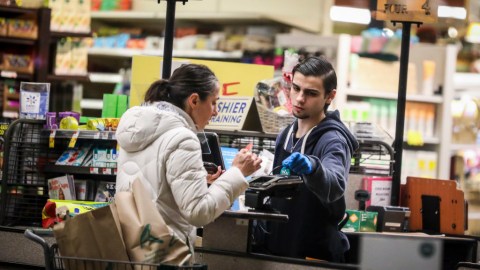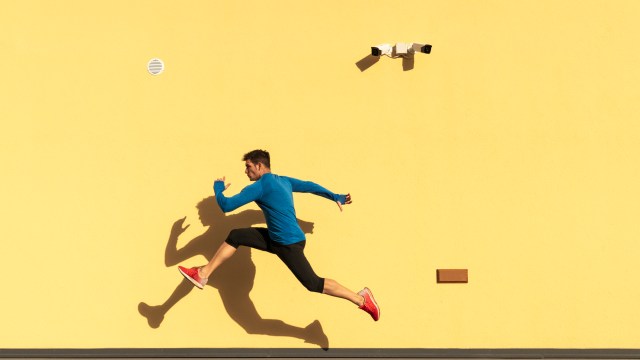5 lessons we can all learn from the coronavirus crisis

Photo by Erin Clark for The Boston Globe via Getty Images
- While no one knows the future, implementing lifestyle changes now can prepare you for returning to a post-coronavirus society.
- Boredom has long been a powerful catalyst for creativity and should not be viewed in the negative.
- Spending more time in the kitchen, walking, and being more thoughtful online can be practiced right now.
Speculating on what a post-coronavirus world looks like seems impossible at the moment. This not-knowing is generating personal and economic anxiety around the world. We must grapple with the fact that a one-to-two month timeline is not feasible and prepare ourselves for what a year or longer looks like.
Being in the middle of a crisis can be fertile ground for preparing what comes after—or, perhaps more pertinent to this discussion, what comes now. Reaching an existential crossroads is an ideal time for self-reflection. It forces you to confront the solitude we usually avoid by endlessly gazing at our phones. As has long been known, boredom is a powerful teacher that should not be overlooked, during this moment, or ever.
As I wrote about last week, transience is part of life. This is the first time the entire planet is collectively experiencing a crisis in my 44-year lifetime. Sure, we’ve witnessed Black Lives Matter, #metoo, and the AIDS epidemic, and there were plenty of people that felt inoculated from those moments. It’s easy to ignore or decry movements that don’t personally involve you. This moment is different.
There are dozens if not hundreds of changes we can speculate on. Below are five currently on my mind.
Creative Time Summit | Keynote Presentation: Rebecca Solnit
Value service workers
For years, I’ve done this: When in line and the person in front of me stares at or talks on their phone the entire time the cashier rings them up, I always ask upon reaching my turn, “How does it make you feel when a person ignores you to look at their phone?” Never once—and my anecdotal study has many dozens if not a hundred responses thus far—has someone replied, “I feel great.” Answers range from “I’m used to it by now” to “It’s like I’m not even a human being.”
Grocery store (among other) workers aren’t having a moment right now because they’re heroes. The dictates of capitalism demand that they risk getting sick or don’t get paid. We shouldn’t appreciate service workers now; we should always appreciate them. The grief that retail workers usually receive is a sad reflection of a twisted social hierarchy. And to think, just weeks ago we endured gripes regarding the impossibility of a $15/hour minimum wage. As a society we need to seriously question the value we place on work, and make that value available to everyone. It starts by valuing those that care for you, regardless of your financial or career position.
A return to the kitchen
With eyes turned on toilet paper and hand sanitizer, as well as the sales surge in pretzels, popcorn, Oreos, and other processed foods, there is good news on the food front: loads of people are baking their own bread. I picked up this skill over a decade ago while living in Brooklyn and fell in love with the patience and diligence the process requires. Sure, the fact that flour and yeast are hard to procure is unfortunate. At the same time, it signals an important return to the kitchen. Americans outsource their cooking and food preparation too much as it is.
In the past week, my wife has experimented with Polish peasant food, pungent Isan soup, and scrumptious butter cookies. We both cook regularly, but given our normally hectic lives, that’s usually limited to weekends. Yesterday, she made cultured butter from scratch, which then went into pancakes. (Fortunately, I’m live-streaming classes to keep moving after all this home cooking.) I’ll return to bread when I can secure flour, but in the meantime I’ll be reopening my Hungarian cookbooks to revisit the dishes my grandmother made.
Hit the books
With Amazon taking up to a month to ship books and local bookstores and libraries closed, there are still plenty of opportunities for reading. (You probably binged “Tiger King” anyway.) Fortunately, ebooks are instantly downloadable. If you’re in a financial squeeze, the National Emergency Library has made over 1.4 million books available for free, and Open Culture is one of the best resources around for discovering open-source and public domain reading materials.
Reading bestows numerous benefits, including increasing your intelligence and levels of empathy. This pandemic has thrown many off-guard. Yet disease has long been part of our biological heritage. Humans have endured pandemics with much less up-to-date information. That said, this is the perfect time to study the history of medicine and evolutionary biology. A grasp of the past empowers you with the understanding of how to move through an uncomfortable present. Take advantage of this time to fill your brain with knowledge.

A man reads his book on his window after partial curfew declaration within precautions against coronavirus (COVID-19) pandemic in Tunisia’s old city Al Madina al-Kadima on March 27, 2020.
Photo by Yassine Gaidi/Anadolu Agency via Getty Images
Back to the basics
“Thinking is generally thought of as doing nothing in a production-oriented culture, and doing nothing is hard to do,” writes Rebecca Solnit in Wanderlust: A History of Walking. “It’s best done by disguising it as doing something, and the something closest to doing nothing is walking.”
Not that walking is nothing. In a sense, it’s everything to us bipeds. Still, Solnit make an important point. The most startling revelation of this pandemic is seeing more people casually walking around on sidewalks than on the roads—and one of my cross streets is the perpetually-crowded Venice Blvd. Even the ubiquitous scooters are nowhere in sight.
We can’t expect these practices to sustain at the current level when self-isolation is over. But maybe, just perhaps, more of us will remember the pleasure of walking. As Solnit implies, it is also a wonderful opportunity to work through those thousands of thoughts in your head. Time and space give you perspective.
Come together
I had, admittedly ignorantly, assumed that a pandemic was one issue that would cut through political polarization. Wow, was I wrong. As mentioned above, this virus transcends race, gender, and class. Yes, it’s particularly dangerous for immunodeficient patients, of which there is a class component (due to food availability and exercises opportunities). Overall, no one wants this virus, and everyone can suffer—if not you personally, then a relative or loved one.
We need to unite and rally around levelheaded science. The growing number of conspiracy theories (5G; bioweapon manufacturing; Advil) potentially hurt others as well. This crisis is often compared to 9/11 where over the months that followed there was fear around New York City. But there was also an overwhelming sense of community. Though I am mostly inside these days, when I do go out for walks, I notice that same sense of “we’re in this together.” Subtle and simple: people making eye contact and saying hello. That is not the usual exchange in Los Angeles.
Reading, walking, cooking, appreciating the person ringing up your groceries, all practices that slow us down and bring us back to fundamentals. Humans are social animals, making this an especially difficult period, as we can’t touch one another. But we can still effect each other, even if through these screens. On the other side of your posts, human eyes stare back. Keep that in mind the next time you sit down to write or share. People all over the world are suffering right now. We can all play a role in alleviating each other’s distress.
—
Stay in touch with Derek on Twitter and Facebook. His next book is “Hero’s Dose: The Case For Psychedelics in Ritual and Therapy.”





